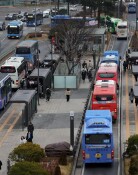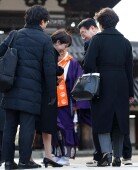Too Addicted to Big Budget to Ease with Expansion
Too Addicted to Big Budget to Ease with Expansion
Posted July. 10, 2018 07:56,
Updated July. 10, 2018 07:56
The Korean government and the ruling party are considering a plan to raise the monthly basic pension from 200,000 won to 250,000 won this September, recipients of which are those of age 65 and older who fall in the lower 70 percent of the income bracket. Added to this, the plan includes an increase to 300,000 won next year, which has been brought forward by two years from 2021, requiring an approximately additional budget of five trillion won.
According to last week’s announcement by the administration and the ruling party, next year’s budget earmarks more than 470 trillion won, an increase of over 10 percent from this year. The plan to raise the basic pension expressly tells how “super-expansive budget” was established for the coming year. Only a 10 percent increase in budget constitutes the highest figure since the global financial crisis in 2009 (10.6 percent). The figure is more than twice higher than next year’s inflation-adjusted growth rate of 4.8 percent, which was projected by the National Assembly Budget Office. It is common to increase budget revenues either by collecting more taxes or by raising national debts. An increased budget plan can prime the pump to boost the economy during a recession. Nevertheless, the problem is that the measure to expand budget is not different from “big budget addiction.”
Look at the increase plan for basic pension payouts. In one sense, it is necessary to lower the poverty rate among the elderly, which remains higher compared to those of other major OECD member states. In another, such a move has to be implemented with the fiscal status quo taken into consideration. This is why it was originally announced to increase the monthly basic pension to 300,000 won by 2021. Late in May, President Moon Jae-in said, “It is a sore spot with the country that income distribution has worsened considering that the first quarter saw a fall in household income levels of those in the bottom 20 percent.” It was only less than two months after his remarks were made that the advanced increase plan was announced. It is no more than a quick fix to mitigate the consequences of a failed policy to hike the minimum hourly wage, leading to increased job losses, and, accordingly, deepening distribution inequalities.
It is another source of concern that the administration and the ruling party plan to expand next year’s employment budget, in particular. The Moon administration already raised the previous government’s budget of 17.9 trillion won regarding job creation with a supplementary 11 trillion won last July. Likewise, this year’s original budget of 19.2 trillion won was supplemented with 3.9 trillion won this April. If the employment crisis is excruciating enough that the deputy prime minister for economic affairs laments over the situation by describing it as “shocking,” even with all such previous moves, it should be noted that the problem does not lie in insufficient budgeting, but rather in policy direction. Failed employment policies have been repeated so far while the government has attempted to address the consequences by spending taxpayers’ money. Such a vicious circle tries patience. The more severe the trade war becomes outside the country, the greater effort the government should make to safeguard fiscal health as a last resort. We should keep our eyes wide open to see whether a budget increase serves as an easy fix to policy failures, and to make sure that taxpayers’ money is not wasted on pork-barrel programs far from job creation.







